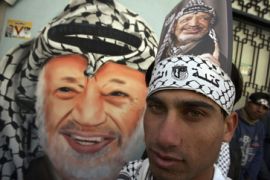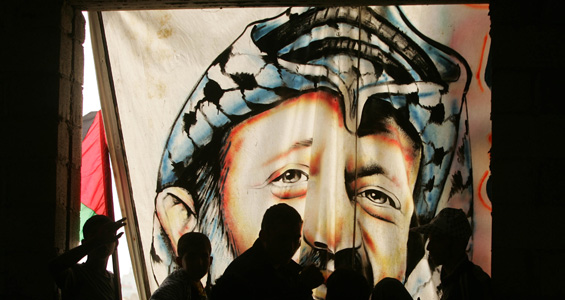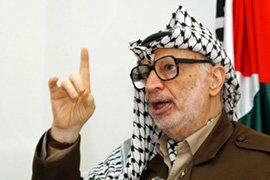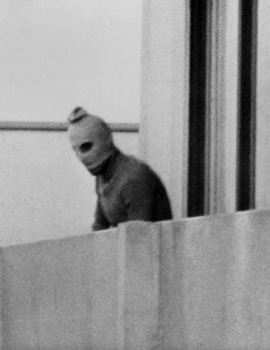
‘Revolution until victory’
Filmmaker Omar al-Issawi reflects on his documentary about the history of the PLO.
 |
| The PLO was created in 1964 and led by Yasser Arafat for 40 years [GALLO/GETTY] |
Filmmaker Omar al-Issawi spent five years making his documentary on the history of the Palestine Liberation Organisation.
In that time, he conducted 150 hours of interviews on four continents – including the last ‘historical’ interview with Yasser Arafat, the PLO leader, and the first interviews with key operatives from the Black September Organisation.
In the following account, he discusses the making of PLO: History of a Revolution.
The six-part series begins airing on Al Jazeera English from Monday, July 13, at 0530GMT.
I had just stepped into Yasser Arafat’s office in Ramallah. There, behind his desk among piles of papers and documents sat the chairman of the Palestine Liberation Organisation, the PLO.
Arafat also doubled as the president of the Palestinian Authority, the first democratically-elected president of the Palestinian territories, and probably the first leader chosen by popular vote in the Arab world.
But to me he was first and foremost the PLO chief and for almost four decades the leader of the Palestinian revolution.
Arafat’s trademark keffiyeh, or Arab headdress, had become a symbol of Palestine throughout the world.
He was, according to Nelson Mandela “an icon in the proper sense of the word”.
What some may not know is Arafat’s trademark phrase, “revolution until victory”. Coined in the late 1960s, it has been used by Palestinians for decades.
Arafat the ‘icon’
My quest for an interview with Arafat began when I decided that I wanted to produce a major documentary on the PLO as a follow-up to a previous film I had made on the Lebanese civil war.
I knew that I had to get Arafat to talk to me.
 |
| Arafat had died by the time the documentary was completed [GALLO/GETTY] |
Arafat sat behind his desk wearing his large reading glasses. I stood in front of him. His aide, Nabil Abu Rudeina, had told me Arafat “did not do history interviews”. I said I wanted to try.
Arafat did not seem to be interested and barely glanced up from the document he was examining.
I played my last card. “May I call you Abu Ammar?”
Abu Ammar was his nom de guerre. He looked up and smiled, “Of course, of course, please have a seat”.
I had secured an interview with the Palestinian leader.
It was the last “history of the PLO” interview Arafat would give before being subjected by the Israelis to one of the harshest and most relentless sieges endured by a leader in modern times.
End of an era
By the time the documentary was completed, I had conducted over 150 hours of interviews on four continents and accumulated more than 50 hours of archive footage and dozens of still pictures and de-classified documents.
During this time, however, three major interviewees had died: Yasser Arafat, Abu al-Abbas, the leader of the Palestine Liberation Front, and Mamdouh Nofal, the former military commander of the Democratic Front for the Liberation of Palestine.
In Washington, DC, during the set-up for an interview with Robert Malley, a former adviser to Bill Clinton, he asked me who I had interviewed.
I rattled off a few names and then concluded: “I interviewed Arafat and now he’s dead, Abu al-Abbas, he’s dead too, and Mamdouh Nofal who has died since.” Silence.
Then Malley said: “What do you want to ask me first?”
“How’s your health?” interjected my sound man, Brian. We all broke up laughing.
Excruciating process
It was a rare moment of levity in what seemed to be at times an excruciating process.
In two separate incidents, for example, I was made to cool my heels at airports; once at London Heathrow and the other time at Washington Dulles.
| IN DEPTH | |||||||||||
|
At Heathrow, a customs officer wanted all kinds of guarantees – the involvement of a local clearing company and a substantial cash deposit – that I would leave the UK with all the equipment I had brought with me.
I had timed my arrival just right and come in on a weekend which did not help matters.
After more than 90 minutes, the officer suddenly remembered that he had a form which would meet my requirements, because “an American film crew had filled one just like it”.
At Washington Dulles airport, the immigration officer did not even bother to return my greeting.
He highlighted in yellow the arrivals form I had filled in, flipped my passport and the form back at me and gave me a blank look. Maybe I didn’t exist.
“What?” I asked.
He motioned me toward an as yet undetermined location in the arrivals hall.
I persisted: “I don’t understand.”
He told me to report to an area to the left of customs. And there I and many others waited for about two hours before being allowed into the US.
VIP treatment
It was a completely different story in Jordan where, from the moment of my arrival, I was treated as a VIP.
I was there to interview the former crown prince of the Hashemite kingdom and was treated as a guest of the royal palaces – the handwritten notation in my passport said so.
My Lebanese cameraman and sound-man arriving via the land border from Syria were stunned to be accorded so much deferential attention.
My arrival in Baghdad in the dying months of the Iraqi Baathist government was an almost surreal experience.
I had entered a country that seemed to accept that it was now living on borrowed time.
I had flown into Saddam International Airport and had my passport stamped there. Today that somewhat incomplete stamp has become a part of history.
So has one of the people I had come to Iraq to interview.
From drama to tragedy
 |
| Black September kidnapped members of the 1972 Israeli Olympic team [GALLO/GETTY] |
I was to meet Muhammad Abbas Zeidan, more commonly known as Abu al-Abbas, the leader of the Palestine Liberation Front (PLF).
It was the PLF which in 1985 had hijacked the Achille Lauro cruise ship in the Mediterranean.
The drama that unfolded soon turned to tragedy when the Palestinian gunmen killed and threw overboard a wheelchair-bound American Jew, Leon Klinghoffer.
After one of the recording sessions (long interviews were always recorded over several sessions) and over dinner at his house Abu al-Abbas was very open.
He said he very much regretted the Achille Lauro affair. I said perhaps his men were incompetent to begin with; he didn’t disagree.
Abu al-Abbas said that if someone were to tell him today that they were going to hijack an aircraft, he would break their arms and legs.
I was sure then that he was more than capable of doing that.
He also made a revelation related to the Achille Lauro affair that perhaps one day I will be able to publish.
And then I detected worry about the future, if not fear.
Fearful future
Abu al-Abbas knew, like almost everyone else, that the US was about to invade Iraq, the country where the Palestinian leader had sought refuge.
He said that during the Clinton administration he was assured that the Achille Lauro case had been dropped.
“But you never know with the Americans,” he added.
“Especially Americans like George Bush [the then US president],” I said, and we left it at that.
The Americans quickly apprehended Abu al-Abbas and he died in US custody the following year.
I had been the last journalist to interview him.
Controversial interviews
I am often asked whether I have any reservations about interviewing controversial figures. The answer is no.
For this documentary on the PLO I interviewed Abu Daoud, the man on whose shoulders the Palestinian Black September gunmen had literally and physically climbed to gain access to the Olympic village in Munich in 1972.
I believe I was also the first journalist ever to interview on film one of the assassins of the late Jordanian prime minister, Wasfi al-Tal.
“We shot him 14 times,” Jawad Abu Azizah of Black September told me 35 years after he had pulled the trigger.
End of the road
It has just dawned on me as I write this account that it brings me closer to the end of the road after several years of very hard and often lonely work documenting the history of the PLO.
In 2008 and 2009, Al Jazeera broadcast the original Arabic version, all 13 one-hour parts of it.
That production has been trimmed to six half-hour episodes on Al Jazeera English, condensing the Arabic version without detracting from the content.
Throughout the long production process of this major documentary I have received Al Jazeera’s full backing.
The network has been exemplary in its support. I doubt I would have had the editorial and directorial freedom from any other broadcaster.
Today, as I watch the unfolding events in the Palestinian territories and look back on the history of the PLO I still have no doubt that there will continue to be a revolution until victory.
